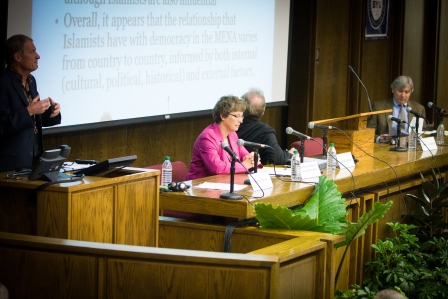




First Plenary Session: The Role of Religion in Democratic Transformations

Natalie Wright Romeri-Lewis, Research Advisor
James R. Rasband, Dean, J. Reuben Clark Law School, and Cecil O. Samuelson, President, Brigham Young University, welcomed delegates and guests.
The first panelist was Jeffrey Haynes, Associate Dean of Faculty, Research, and Postgraduate and Director of the Center for the Study of Religion, Conflict, and Cooperation at London Metropolitan University, UK. The presentation of Professor Haynes focused on "Religion, democratisation and the Arab Spring." The democratic direction of the Arab Spring in the Middle East and North Africa (MENA) is neither clear cut nor unidirectional, observed Professor Haynes. The relationship of Islamist with democracy in MENA varies from country to country, informed by both internal and external factors. The relationship of how religious actors affect democratisation had long been controversial, and it seems it seems clear that, so far religion is not pivotal actor in relation to democratization in MENA. Professor Haynes concluded by stating that the third wave of democratization in Eastern Europe is not the same as the transformations emerging as a result of Arab Spring.
The second panelist was Sophie van Bijsterveld, Professor of Law at Tilburg Law school, Universiteit van Tilburg, the Netherlands. Professor van Bijsterveld began by explaining how a strong civil society evolved in the Netherlands, a case study for how religion and democracy can interact. For centuries, the majority of residents knew about and understood the various religions throughout the Netherlands. Government and public institutions developed alongside religious communities, known entities. The last century has seen a rise of faiths, including Islam, that are relatively unknown to many citizens. Policy and law must reflect how society has decided to treat religion as an entity and whether to better integrate and protect the practices of faiths that are relatively unknown, but quickly growing.
Professor van Bijsterveld noted that democracy and religion also interact when a faith is uncompromising about a particular religious practice. For example, although some European and South American Jews may be uncompromising when it comes to male circumcision, the laws of their nations may reflect rising concerns about the physical integrity of the child. In individual legal cases, Professor van Bijsterveld would like to see legislators and judges allow time and room for healthy debate regarding the place of religion in democracies. Because democracies like to solve problems quickly, a rapid judicial ruling or law may not reflect all perspectives and might create more problems than it solves.
The third panelist was Scott Hibbard, Associate Professor, Department of Political Science, DePaul University, USA. Professor Hibbard reviewed recent Egyptian history and concluded that Egypt is in transformation. "Post-Arab Spring politics has begun a debate on the role of religion and minority groups in society." Although some stakeholders believe that Islam threatens democratic state-building, Professor Hibbard believes that the military, militant groups, and the Salafists -- not Islam -- threaten Egypt's democratic transition. Professor Hibbard next noted that democratic transitions have economic, political, and cultural aspects. First, he explained that what drove people of both sexes, all ages, and all socio-economic levels to the streets was economic discontent and a perceived lack of future. Second, a country needs free and fair elections to fulfill the political requirements of democracy, but such elections are not sufficient when viewing democracy as a ladder to climb.
Professor Hibbard spent the majority of his presentation addressing the third category of government transformation: cultural change. Under phase one of the transition, diverse people protested alongside each other. The majority of people voted for the Muslim Brotherhood as an alternative to Mubarak and his family -- not as a declaration that they wanted an Islamic state. The Salafists and Muslim Brotherhood led well-funded and well-organized campaigns, benefiting from both the financial contributions of Gulf countries which oppose democracy and from broad grassroots networks. Despite growing interest in democracy and political reform, secular political groups lost because they lacked money and such grassroots organizing.
Under phase two of the transition, Egyptians become divided as they are asked to consider the type of state they would like to create and who is "Egyptian". When advancing democracy, Egyptians prefer to use "civil state" and not "secular state" as the latter conjures notions of Colonialism and Western culture. Using that terminology, should a state be religious? Should a state be civil and neutral to religion in that it does not discriminate in belief? Are Egyptians Muslim, Sunni Muslim, or something else? The agreement on group identity will shape Egypt's Constitution.
Professor Hibbard stated that in addition to identity, Egypt will have to answer major questions regarding political philosophy: Is it the role of the state to use government coercive power to create a religious state if desired by the majority? The Salafists understand democracy to mean that if a majority of people vote in the Muslim Brotherhood then that party has the right to change the rules, including judicial procedure, women's rights, and the rights of non-Muslims. Factions within the Muslim Brotherhood show generational divisions and ideological divisions. Some factions want more of a "civil state" than others. However, some Islamic scholars see the importance of distancing government and religion for the sake of protecting religion. Thus, an unintended consequence of Arab Spring is a very vibrant debate on what is the role of religion in society and how each group can interpret its own religion in a modern state.
